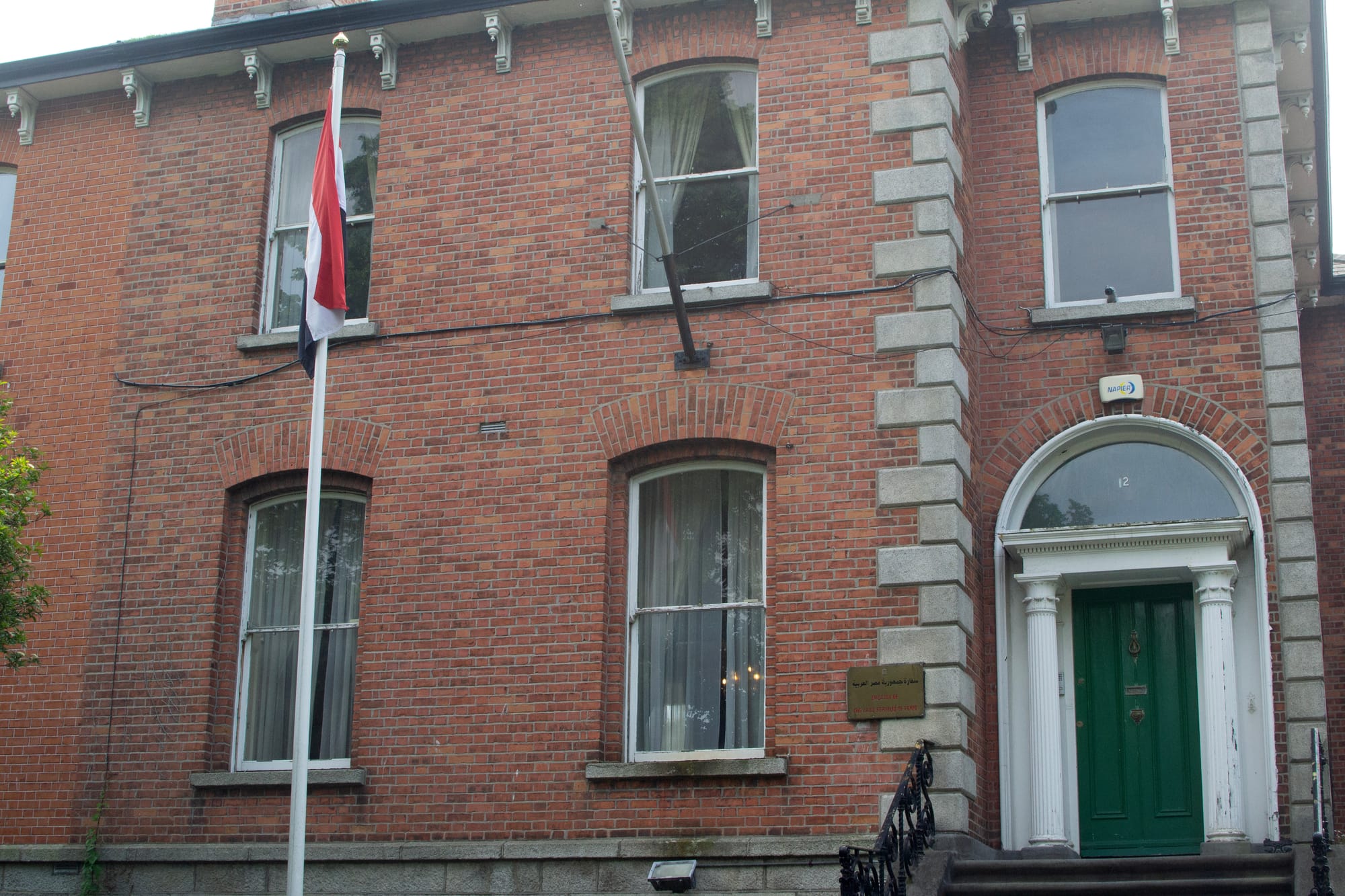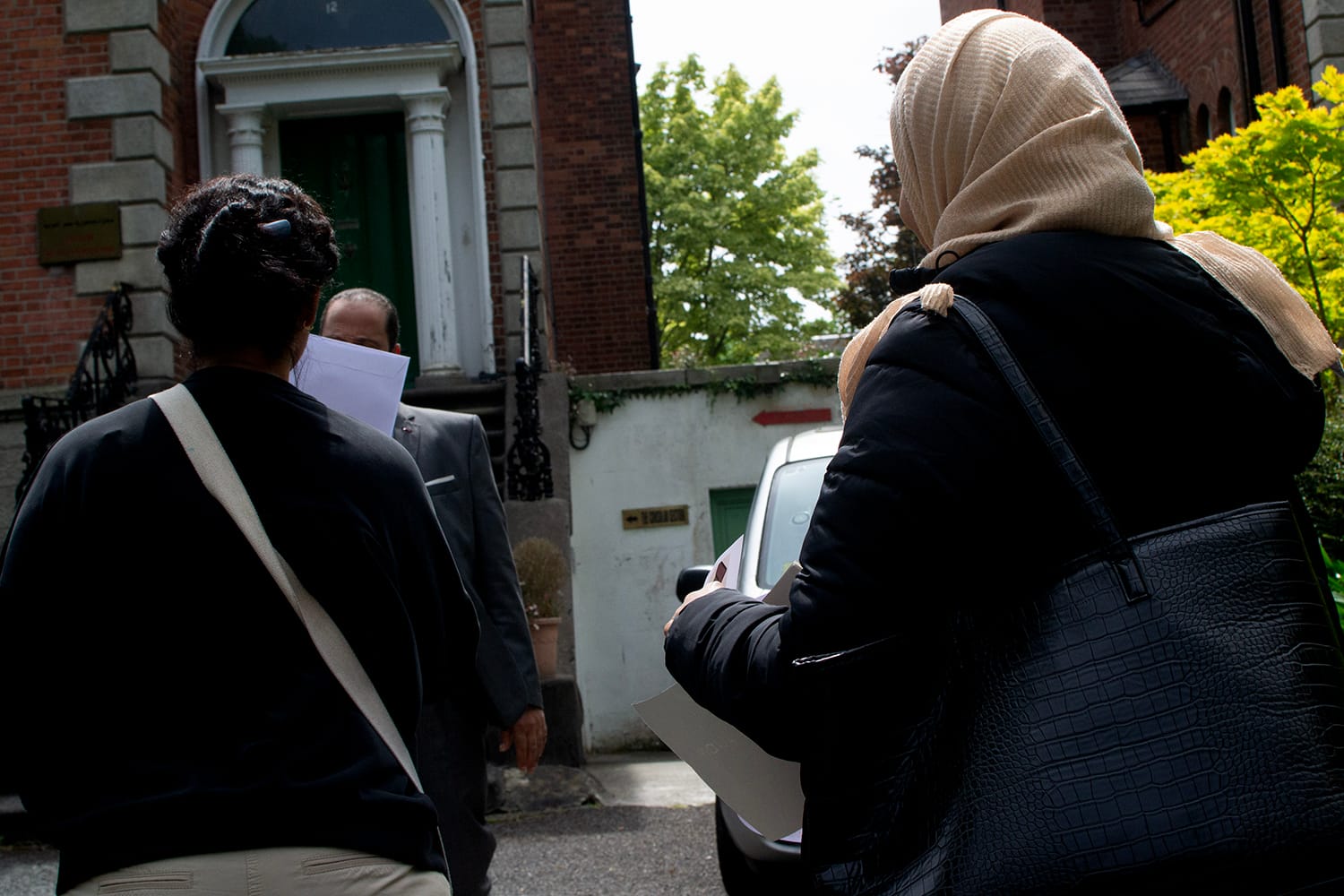What’s the best way to tell area residents about plans for a new asylum shelter nearby?
The government should tell communities directly about plans for new asylum shelters, some activists and politicians say.
Arwa Ahmed, a paediatric registrar at Temple Street Children’s Hospital, says she just wants to go visit her mum, who has heart disease.

On Friday morning, Samara Muhammed crossed a sunlit street in Ballsbridge to stand outside the Embassy of Egypt in Dublin.
She clasped a bit of paper to her chest.
Muhammed, wearing a hijab over a cream trench coat, cast a befuddled glance a few metres ahead.
A man draped in the Palestinian flag was hollering slogans into a megaphone. “Baby killers, profiting from genocide,” he yelled, at the red-brick building as his friend banged on a shiny red drum.
A little earlier, he said he and two friends were there to show revulsion at how an Egyptian travel firm charges desperate Gazans up to $5,000 per adult to help them pass the Rafah Crossing out to safety.
But Muhammed, while sympathetic, she says, is not there for this protest.
As soon as Arwa Ahmed shows up, they both stroll down the street to wait out the small display. Soon Sanaa Basit rolls by, pushing her daughter’s pram. Then Muhaned Hussain joins them, wearing jeans and a grey hoodie.
Before long, there are six people lining the pavement outside the embassy with signs and placards – all Sudanese immigrants gathered to protest how the Egyptian embassy is not processing their visa applications to visit Egypt, where their families have fled to from war-scarred Sudan.
Some have waited for almost a year for a visa, they said. They have to reapply if they don’t hear back within three months, said Ahmed. So they do, over and over and over again – and yet, nothing, she said.
As they wait, some have lost loved ones, unable to say goodbye or visit their graves. Some have ill and frail parents they miss and siblings and partners they ache to hug.
“My brother died last October. I tried to apply for a visa, but they didn’t respond,” said Muhammed. She’s holding a sign that says: “We just want our rights to travel to see our families.”
Meanwhile, bringing family over from outside the European Union to Ireland under the Department of Justice’s current policy is expensive and mostly accessible to wealthier immigrants – especially for those with elderly parents.
Spokespeople for the Egyptian Foreign Ministry and the Embassy of Egypt in Dublin have not responded to queries sent on Thursday, asking why it is not processing applications from citizens of Sudan.
The Egyptian government brought in visa restrictions for Sudanese citizens in June 2023. That was two months after the current war started, when they needed out the most.
“Crackdown on illegal activities” and “management of increased influx” are cited as the rationale for this visa requirement, on the website of Egypt’s E-visa application service.
It says the country is hosting about 200,000 displaced Sudanese already. The website talks of “more controlled and efficient management of Sudanese citizens entering Egypt”.
Between April 2023 and March 2024, nearly 14,800 people were killed in Sudan.
The war has displaced 8.5 million people, the vast majority of whom – about 6.5 million – still live in Sudan, according to the United Nations Population Fund.
“An estimated 1.2 million pregnant and breastfeeding women are acutely malnourished,” says the agency.
In April, it warned that nearly 220,000 malnourished Sudanese children and 7,000 new mothers would likely die over the following weeks and months without proper food and care.

Ahmed, one of the organisers of the Friday protest, is a tall woman wearing a shimmering cream shawl over a black jacket. She is a paediatric registrar at Temple Street’s Children’s Hospital.
Her displaced mum in Egypt has heart disease, she said, the same condition that runs in her family and killed her grandfather.
She worries about her, Ahmed said. “It’s just so much distress and agony.”
She lodged her first visa application in June 2023 and again and again every three months since, she says.
Enduring this separation and anxiety while working in an overburdened Irish healthcare system is not easy, she said.
She said the group were hoping that the Tánaiste Micheál Martin, the Minister for Foreign Affairs, would also speak to his Egyptian counterpart on their behalf.
A spokesperson for the Department of Foreign Affairs has not yet responded to a query sent on Friday asking if the Tánaiste would do that.
Basit, the woman who’d brought her toddler along, said her mum lives in Cairo. “They had to leave Sudan in a very bad situation,” she said.
She said her siblings who live in the United Arab Emirates or Saudi Arabia can get visas to see them, but the embassy in Dublin won’t respond to her applications.
“My mum is sick. I can’t see her,” said Basit, holding a placard that said, “I want to see my mom.”
She’s been stuck in the looping application process, just like Ahmed. “And they’re very cold when answering the phone,” she said.
Basit lives here with her husband, who’s a doctor, she said.
She says it hurts that she can neither visit Sudan nor Egypt. “My dream is to visit my dad’s grave in Sudan.”
Hussain said his family, including his wife, were left behind in Egypt. “All I want is just to go there for a few days, just to say hi, to know what they’re doing, that’s it.”
Sahar Esameddin’s voice drops when talking about her mum. She hadn’t seen her in two years, she said. “It’s very bad, at least we need a decent reply.”
She was so restless that she went to the United Kingdom to try to apply from there. They told her she couldn’t because she was not a British resident, she says.
They say they’re grateful that Egypt has allowed their families to find homes in the country. But it should let them visit too, she says.
They all have jobs and careers in Ireland and promise they won’t overstay their visas, they said.
A little after the group clustered outside the embassy, a guy with a moustache in a grey suit and a dotted tie appeared near its gates.
In Arabic, he asked what their business was. It’s about the visas, they said. He sighed and slipped back inside.
A little later, another guy in a suit opened the gate and strolled towards a Mercedes parked nearby, avoiding eye contact with the group, and drove away.
“You see how they treat us?” said Basit.
The group had brought a letter – that paper that Muhammed had clasped to her chest – for the Egyptian foreign minister, asking for help. Ahmed put it in an envelope.
“Reopening the visa issuance process for Sudanese citizens would greatly alleviate suffering and strengthen the human bonds between the Egyptian and Sudanese people,” the letter said.
Basit and Ahmed approached the embassy’s closed gates. The guy in the grey suit reappeared.
He asked if everyone spoke Arabic. “Everybody here speaks Arabic,” said Basit in Arabic.
The guy told them they could come back on Monday to meet the ambassador. But they immediately told him that Monday was a bank holiday, shaking their heads no.

The guy sighed again, took their letters and disappeared inside again. When he returned, he said they could come back on Tuesday for a meeting.
“Do you mean as a group?” asked Basit, in a mix of Arabic and English.
As a group, the guy said, but they needed a spokesperson.
When he left, they were happy, seeing that as a small victory. They huddled in a circle, all smiles, gabbing in Arabic.
On Tuesday morning, five people, including a baby boy and two toddlers, waited outside the embassy for Ahmed, Basit and Tamer Mohammed, who’d gone in to be their voices.
After about an hour, the trio emerged from the embassy’s green door and climbed down a flight of stairs.
Ahmed’s eyes were red. They didn’t have good news, she said. Others clustered around her.
The ambassador had told them that the embassy was forwarding the visa applications to the Ministry of Foreign Affairs in Egypt but didn’t know why it was not processing them, Ahmed said.
“He said maybe they’re issuing in the UK because the Sudanese community is much, much bigger there,” she said.
Ahmed said that he had also told them that the United Kingdom was a more important country to Egypt.
He had talked about the economic burden of hosting so many Sudanese and the toll of sharing a border with Gaza.
Ahmed, Basit, and Mohammed had told him they’d let Egyptian authorities control their every movement to ensure their return.
The ambassador said he would convey their message to the ministry in Egypt, but he couldn’t promise it would spur change, Ahmed said.
Esameddin, who’d said earlier that she was hoping to spend Eid-al-Adha with her family in Egypt, stood watching Ahmed talk with her head hung.
“We just want to visit our families,” she said.
Get our latest headlines in one of them, and recommendations for things to do in Dublin in the other.